Safe Camping. Easy Camping Safety Tips.
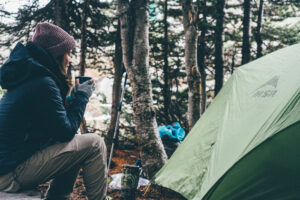
Camping is a wonderful past time and millions of people enjoy the outdoors each year.
But one thing I hear is, “Is camping safe?” Or, “How do I go camping safely?” In this article we will cover safe camping practices and give some easy camping tips. As well cover what not to do when camping.
Is camping safe?
Camping can be very safe.
More people are injured by playing sport then camping. However there are a few things to be aware of and what should you not do while camping?
Here are some safety tips and information for safe camping:
Don’t wonder off by yourself from the campsite. If you are going bird watching, hiking, or trying to find a fishing hot spot, tell someone in your camp group where you are going.
Don’t rely solely on your cellphone app or GPS for your only navigation source. Phones can have bad reception. GPS devices and mobiles can get wet, or damaged and the battery can go flat.
Remember to have a map and compass, (Know how to use them. For information visit – How To Use A Compass.) water bottle, first aid kit and a warm jacket, or waterproof coat in case the weather goes bad.
Don’t drink the water straight from the lake or river. Even if it looks clear, there could be animal feces in the river upstream. Always boil, or filter the water.
Don’t pick or eat any mushrooms or plants, unless you are 100 certain what they are and safe.
If you have never used an axe, or hatchet before to cut firewood, don’t go swinging it around. Have an experienced person show you how to safely chop wood. This goes for knife safely as well.
Always carry extra water.
Water as you probably know is essential to life and we can only go about three days without it. This does depend on the conditions, exertion levels, but you need water to operate effectively.
It is amazing how much water you go through camping. Such as preparing or cooking food, boiling up the billy pot for coffees, personal hygiene use, etc. Always take more water than you think.
Is it safe camping in a tent?
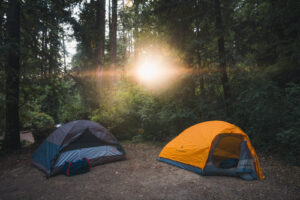
Camping in a tent is very safe if you some simple very guidelines.
First time camping tip is to, close the zippers on the tent, day and night. This stops any nasty insect getting in the tent.
At night time if there are any mosquitos around, I will spray the entrance or the tent with insect repellant. Don’t do this right before you are going to go to be though as it can be smelly.
Don’t camp under any dead trees or limbs that may fall down. They call these tree’s widow makers for a reason.
While some species of trees are more likely to fall, then others, don’t think a dead tree will just fall down only on a windy day. (Or any tree for that matter.) On hot still days, some trees can come crashing down. So avoid camping directly under trees.
Put clothes and bags straight into the tent, don’t leave them on the ground, where insects might get into them.
Look very careful on the ground and around before setting up. Avoid setting up on bull ant’s nest, and avoid areas with poison ivy and poison oak is.
Don’t set up the tent near any game trails where wildlife travel.
Likewise, avoid setting up very close to a lake or river. Animals may come into drink around the water’s edge. The river or water way can also rise and flood.
How dangerous is camping with children?
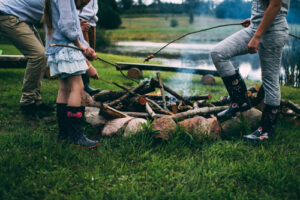
There is more supervision and some work, depending on their age. But with a few simple guidelines, camping with children can be safe and lots of fun.
This will depend on their age and experience, but here are some ideas and camping tips with children:
When I go camping, I give my children, bright fluro orange hats. This makes them easy to spot when they are playing around the edge of the camp site. Also, it shades them from the sun as well.
The children know not to put their hands in any logs, or under any rocks that they can’t see. When collecting firewood they are careful what they pick up.
If they children can’t see the campsite, they know not to go any further away.
They are also told if they do get lost, stop moving. Stay where they are.
I like to give my children a mini survival kit. It has a whistle. (It is a Fox40 whistle, that is a good brand and it is loud. But any decent brand of whistle will do.) The children know to blow it three times and pause, blow it three times again and pause.
The mini survival kit also has an orange bandana, which they can tie onto a stick and wave it about. (This doubles up to help hold hot items when eating.)
If we do go for hikes, or finding new fishing places, then we have a kit on us.
The kit might have a water bottle, space blanket, muesli bars, cordage, spare clothing, headlamp, small first aid kit and a pocket knife. Of course this will depend on the age of the child.
(This basic survival kit should be the minimum that adults should carry as well. A small kit in a day pack or bum bag is peace of mind.)
Avoid camping close to lakes, rivers and ponds if the children are young. Always keep an eye on the children. Tragically every year children (and adults) drown in water ways that aren’t supervised.
Be mindful. – It is one thing to swim well in a heated pristine pool, it is different to unexpectedly fall in cold, murky water with clothes on.
If doing watersports, or boating and fishing, make sure you have and wear PFDs or life jackets.
Safety around camp fires.
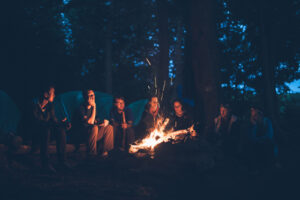
Don’t light any campfires in hot, dry and windy areas. Follow the parks or forest regulations about where, or if any fires are allowed.
Always clear the area free of grass, leaves and debris. Never leave the fire unattended.
With children, explain the rules about running around, or playing close to the campfire.
When the children were younger, I would draw a line around the camp fire and tell them do not get any closer than that.
Obviously, if they are very young then the child will have to be watched around the fire.
If you do have a fire, perhaps only have it for the evening dinner. This way the fire is not going all day and could be a danger in itself, by not being monitored.
Always have water close by and a shovel to help put out the fire.
Avoid too much alcohol. Campfires and alcohol don’t mix. Also lakes and alcohol, are a no go for safety as well.
Always triple check and make sure the camp fire is out before you leave the area. Pouring water until the coals are soaked is recommended. Tidy up and clean the area up.
How to feel safe when camping.
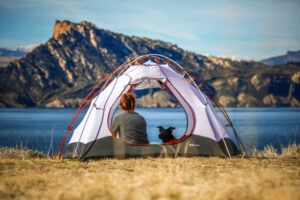
Start in small steps. Don’t go to a remote camping spot in the middle of nowhere, if you are not used to camping. Take it easy first.
If you have never been camping before, start in your back yard. If you don’t have room, a friend or relation might let you set up a tent in the back yard.
Setting up a tent in a RV park if allowed or caravan park might be the next step. After you are comfortable in that environment, you can start exploring some other camping options and places.
When you are ready to go camping, do your homework.
Do a search on the camping spot and ask questions like: Is there phone reception? What will the general weather be like? What type of animals are around? Are their Park Rangers close by? Is their water available, does the water dry up? (A water filter is recommended even if you know that there are water supplies in the area.)
A Park Ranger might be able to give you the positives and hazards of camping in that area.
Before you go, if you are anxious about certain wildlife, do some research and you will find most wild life isn’t out to get you. Most wildlife, if left alone will avoid you. The more you know about bears, snakes, or whatever you are afraid of, you will realize that with some healthy respect and knowledge, they are not the boogey man.
Have a map of the area and know what major roads, towns, etc. are close by. The more you know about the camping spot the safer you will feel. Know what services are available. Is a police station close by, or how far away is the nearest hospital?
Camp in the right season. Camping in monsoon season with torrential rain, or in the peak of winter snow can be dangerous. So pick the right times and seasons to venture out.
When camping – Tell friends and family were exactly where you are going and what time you will be back.
Include in the information phone numbers of the friends and family who are going with you. Write it down and inform two separate people of where you are going.
Also some parks and police stations have a book for campers and hikers. It will list contact details and note where people are going and when they should be back.
Feeling safe when camping.
If the camping location is close by, you might just do a day trip. Do a few of these trips and get to know the location. The more time you spend in the woods, the more comfortable you will be.
Do a few small hikes and explore the area and you will soon feel at ease with the location for an overnight camp.
Go camping with friends, is another way. Camping with a large group of like-minded people and friends can give you peace of mind.
When camping, know where your torch and headlamp are. Don’t leave getting out the torch at night time when it is hard to find or see. Get the torch out before dark and put it somewhere easy to get.
Remember to have a headlamp and torch with fresh spare batteries. Check the batteries and change them before you camping.
Have a cell phone charger all charged up. Make sure it is reliable.
Have a first aid kit, and know how to use it. Take a first aid course. The more training you the more confident you will feel.
Check the weather.
Check the weather before you go, being mindful that they are not always 100% accurate.
Have extra clothing and jackets in case the weather turns bad quickly.
Some locations can get three seasons in one day, so be prepared for wet or cold weather.
Getting sun burn can be very painful and ruin the trip. So make sure you have a wide brimmed hat and sunscreen. A good pair of Polarized outdoor sunglasses will help protect your eyse and reduce glare.
If you are prone to getting burnt, wear a light long sleeve shirt and pants.
Camping in the rain.
Getting wet and cold at night can be dangerous, so here are some ideas for camping in the rain and staying safe.
Have more than one way to start a fire. If the matches are damp, or the lighter is out of gas, have a backup way. Having two or three ways to start a fire and some dry tinder is good safety.
Don’t set up your tent in a dry river bed or low lying areas. Even if it not raining, as it can flash flood in minutes. Don’t set up your tent in a depression as it can flood.
Avoid putting your tent close, or under cliff faces. As the rain can dislodge rocks and earth causing a landslide.
Safe camping means being prepared when camping in the rain. Have a spare set of dry clothes in a dry bag, so it protects them from getting wet.
Also make sure your sleeping bag is safely in a dry bag, or a garbage bag, sealed up.
Having cold wet clothes, or wet sleeping gear at night can lead to hypothermia, be aware of you and your family’s body core temperature. When people start to complain about the cold, or start shivering be mindful. Warm up with dry clothes and extra sleeping gear.
Beanies, gloves and scarfs can help control your temperature and avoid getting cold.
Make sure you have set the tent up before. Trying to set up a new tent in the dark, while it is raining is a recipe for a very bad experience.
Make sure you have enough poles and guy lines / rope to set it up properly. High winds as well as rain can be an issue if the tent is only half set up.
Have an extra tarp that can be set up in front of the tent. This will help for a dry place when getting out of the tent. Also a place to eat under, or relax.
Safe camping. – What are the dangers of camping with wildlife?
Check for ticks. – In areas prone with ticks, it is a good idea to check your partner, or family for ticks regularly. Use tick repellent on boots and pant legs, etc. Don’t sit or lie down directly in the dirt or foliage.
Snakes. – On hot days in certain areas, snakes can be about. Snakes will generally avoid humans, but don’t walk were you cannot see.
Don’t wear shorts, sandals and walk through long grass. Keep to proven clear trails. Be careful when collecting firewood or around rocks, were the snakes might be. Know your first aid procedures for your area.
Bears. – Follow the parks rules and regulations when it comes to bears. Check with your Park Ranger about best practices when dealing with bears.
Don’t have food stored in your tent. Cook and store food away from your tent. In some places you will have to use a bear canister for food.
Take rubbish home with you, this is not only camping safety, as wildlife can be drawn to areas with food scraps. But it is your responsibility to take the rubbish home and keep the camp site clean. It looks awful with rubbish laying around. Now wonder some place don’t allow camping!
Mosquitoes. – This is one insect that can carry all types of diseases. So cover up with long sleeve pants and shirts.
Avoid camping near stagnant waters and use insect repellent.
Camping Tips. Easy camping meals.
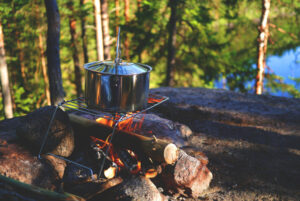
What has easy camping meals have to do with camp safety? Well a lot actually, read on….
Trying to cook a meal on the hot campfire, if you have never done it before, can be hard and dangerous.
Especially trying to watch where the children are, trying to prepare a five course meal with a roaring hot fire, and still trying to set the tent up.
There is a chance you might burn yourself if you haven’t cooked with an open flame before. Or lose track of where the kids are playing. At the very least, you can burn the meal.
So if it is you very first time camping, have some easy camping meals that are quicker and safer to cook.
Dehydrated and freeze dried camping meals, that you just add hot water too are ideal. Or items like Ramen noodles, cans of beans and stews, packets of soups. Instant pasta, Mac and cheese, etc., work well.
If you want the meals healthier, have some pre-cut vegetables ready to add.
Later on, you can experiment with mouth-watering camping meals.
But for your first time cooking with an open fire, start slowly. If you want to cook some more adventurous meals, have some back up easy meals on standby in case e it doesn’t work out.
For safe cooking have extra-long reach tongs and long cooking utensils so you don’t have to get too close to the fire.
Avoid cooking while the campfire is roaring, put the fire on early and let it burn down to coals. The old saying, flames for boiling, coals for cooking is true.
It the heat from the campfire is too intense and hot, move some coals away too cook on. Make sure it is safe to do so though.
Other options for cooking, that might be easier to cook on are a camping gas stove, burners, or a Trangia type spirit burner. Each has their own pros and cons. Learn how to use them safely before you go camping.
Have spare food in case you drop any food on the ground (The children normally will drop something.) or accidentally tipped over in the fire. Children with no food, is truly a danger you want to avoid! (I am joking, but don’t go down that path of camping and no food.)
Have water on stand by and make sure the area is clear of leaves, roots or anything that can catch on fire. Have extra water for cooking and putting the fire out.
Hot chocolate and blocks of chocolate go down a treat after the main meal. (I like the chocolate blocks with fruit and nut in them. It seems to go perfect with camping.)
For more tips and information, click on, Camping tips
Driving safely.
Camping is safe compared to the actual driving to the camp spot, or the drive home. Driving is probably the most dangerous part of the whole camping trip.
Remember to give yourself plenty of time packing up the camping gear. Especially if you have to be home at a certain time. You don’t want to rush home, driving distracted.
After a few days camping, it can get very tiring. So if you are driving a long way home, break the trip up with lots of toilet breaks and stops.
For extra-long trips an overnight stay might be a good idea, so you are not fatigued when driving.
Conclusion. Safe camping.
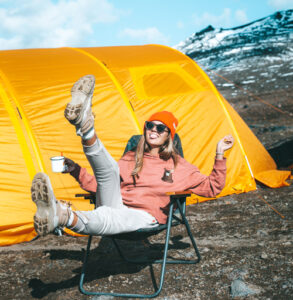
Sometimes, especially with children, the camping trip doesn’t go to plan. Such as the best camping spot is taken, or it rained, or something wasn’t packed and left behind.
So with all that, sometimes you just have to roll with it and have fun. Even when things don’t go to plan, the trip can still be a safe one with some thought and some preparation.
Safe camping and remember to pack the marshmallows.
